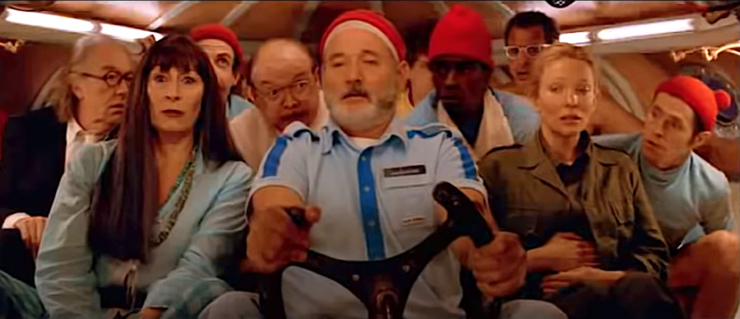Here at Tor.com, we spend a lot of time thinking about fantasy, worldbuilding, sword lineages, how centaurs give birth—you know, the important stuff. But sometimes I just want to kick back with a movie or a TV show from a different genre. An action movie, maybe, or a comedy special. But then, before I realize what’s happening, I find myself analyzing the film or show before me as though it too, is speculative fiction. What are the rules of this “21st Century New York”? That dog the hero has just rescued, can it speak? Sure, right now this beefy man and his found family are planning an intricate heist in a modern South American city, but is it possible that by the end of this film they’ll all be…in space?
It’s possible that this job has colored my thinking in certain ways. But the more I ruminated, the more it made sense to me that several of my favorite pop cultural artifacts are actually operating as fantasy worlds, despite their alternate genre labels. I’d love to hear about your favorite fantasy-adjacent worlds in the comments!
Fast & Furious
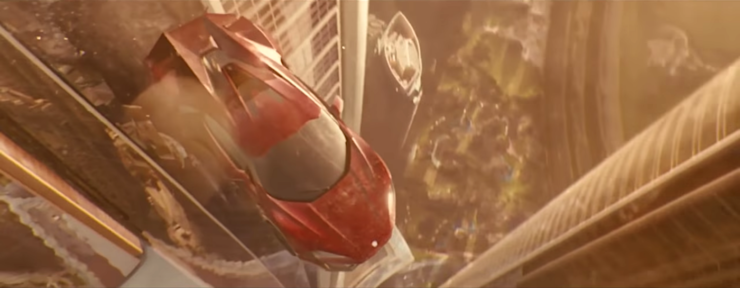
The “Fast and Furious” series began as a somewhat realistic story about street racing and the importance of FAMILY. (It turns out that FAMILY is extremely important.) But beginning with the fourth film, things began to change. You know that scene in The Incredibles when Dash realizes he can run on water? That’s what F&F has become. In each film Dom or Hobbs realize that they can make their cars do slightly more death-defying things than in the previous adventure, and then build upon that knowledge until cars are racing planes and leaping between skyscrapers. People die onscreen, only to come back later. People suffer amnesia and then recover from it. Paul Walker’s face remains Paul Walker’s ridiculously symmetrical face, no matter how oft Brian is socked for being a secret cop. In the spinoff, Fast and Furious Presents: Hobbs and Shaw, the franchise finally embraces a new level of science fiction with Idris Elba’s Brixton, the “Black Superman” who I think counts as a cyborg? And as an F&F fan, you just learn to accept what the films give you like Harry Potter following Hagrid into Diagon Alley.
John Wick
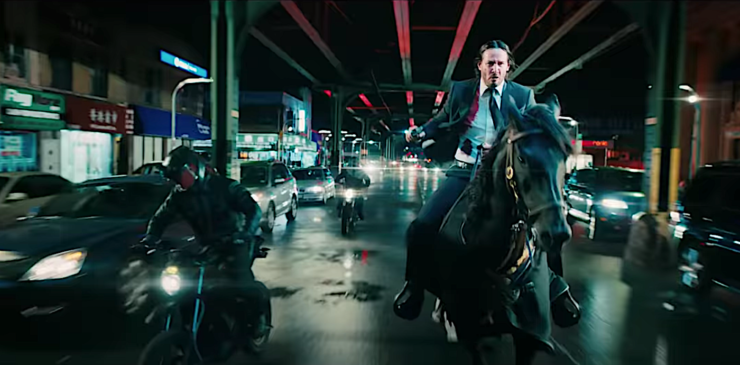
As in F&F, the Wick series started out straight-ahead action movies. The protagonist seemed a little too tough, but that’s just the nature of the modern action hero. Three films in, however, there’s a level of worldbuilding and magical thinking that simply isn’t present in something like The Transporter or Die Hard. It’s not just that Wick himself seems nigh invulnerable—it’s that the world around him operates according to its own rules. How are there so many secret assassins, even in a city as big as New York? Who founded the system of coins and markers? Why does everyone fear The High Table? How many Continental Hotels are there? Is this some sort of AU, or do these people all somehow negotiate with your standard mafia bosses? And any action movie that makes that many references to The Matrix has to have some more secrets up its cinematic sleeves.
The New Pope/The Young Pope
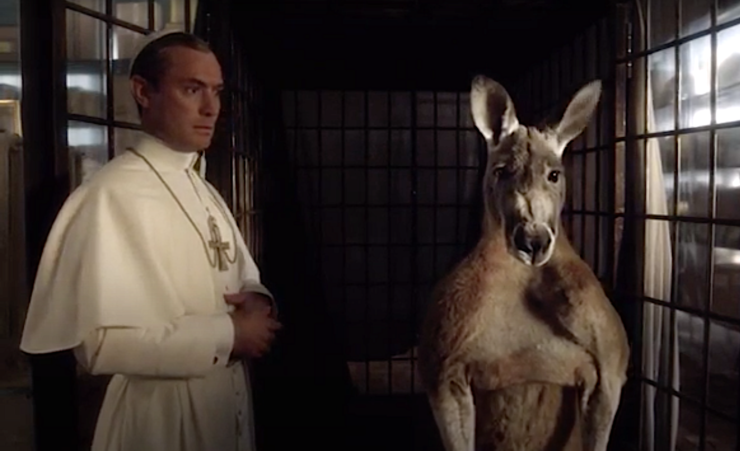
It’s become something of a joke around Tor.com parts that I will find a way to drag the Pope Shows into any conversation. (But they’re so good! I would be remiss as a cultural critic/professional shitposter not to point this out and tell you to watch them!) And having said that, the world of The Young/New Pope truly does operate as its own, contained fantasy realm. First it posits a world where a forty-something from the U.S. could be elected to the papacy, and then gives us a Vatican that seems to operate fully in its own bubble. The Pope wanders from garden to garden, giving only the barest glances toward the outside world, micromanaging the lives of his inner sanctum, and trying to establish a psychic connection with his pet kangaroo. (Really.) The Pope visits what appears to be a fictional African nation, but another priest goes home to a definitely-real Honduras. And at the same time, known figures from our world, like Sharon Stone and Marilyn Manson, co-exist with fictional figures like the Philip Roth-esque novelist Elmore Coen. But what becomes increasingly clear is that in the world of the Popes, there is a genuine and at times operatic connection with the Uncanny. Miracles are real, the Pope can sometimes control the weather with his moods, and death does not always stick.
The Whimsical (Until It’s Not) World of Wes Anderson
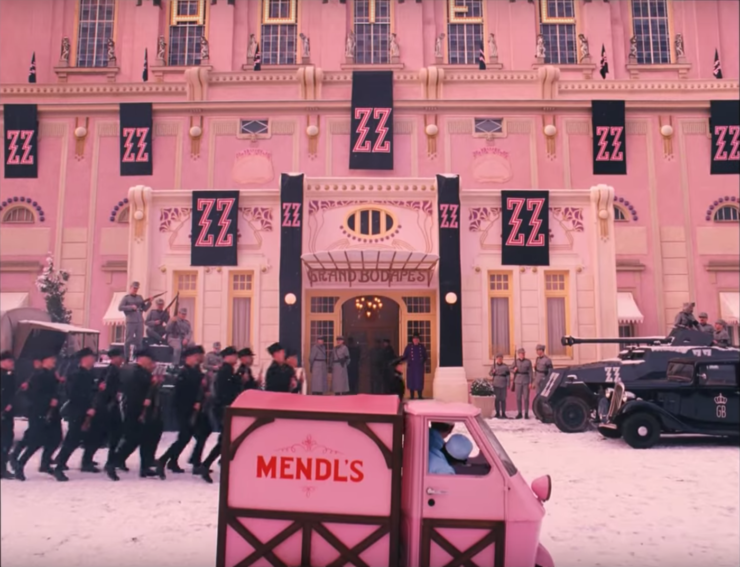
There are no dragons here, no sword-wielding heroes or wise wizards. But there are jaguar sharks and an ever-shifting avatar of Bill Murray. There are mythical quests into the hearts of mysterious islands. The New York of The Royal Tenenbaums is not a New York that has ever quite existed, equal parts Salinger stories and The Mixed-Up Files of Basil E. Frankweiler, where it’s simultaneously the ‘70s (but less violent) and the ‘90s (but less finance bro-y); The Life Aquatic with Steve Zissou takes place in a world that can sustain not one but two different celebrity oceanologists, who live in ruthless competition with each other; The Darjeeling Limited creates a world where I can feel deep empathy for a trio of white boys “discovering” India; most tellingly, The Grand Budapest Hotel explicitly gives us a world that went through different upheavals than our own. By inventing the kingdom of Zubrowka, Anderson is able to compress the rise of fascism, the Weimar Republic, Nazism, and communist partition all into one discrete country, so the forces of progressivism and authoritarianism can duke it out directly, but he also makes it clear that he’s created his own insular world.
Into the Mulaney-Verse
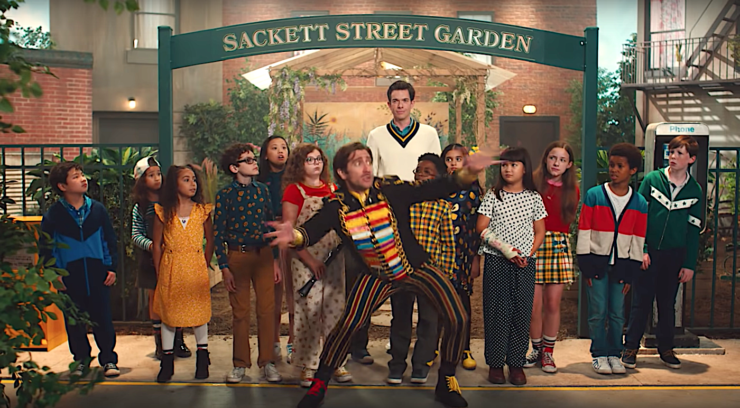
John Mulaney masquerades as a realistic comedian. If you only see small clips of his work like the “What’s New Pussycat” Jukebox Anecdote, or one of his riffs on Ice-T’s amazing work on Law & Order: SVU, you would think he was a kind of neo-Seinfeldian observational stand up, mining mundane life events for inoffensive humor. He can also write pitch-perfect parody, as evidenced by his work on Documentary Now! But if you dig even a little you’ll see that there is, in fact, an alternate Mulaney-Verse. (And of course, no comedy occurs in a vacuum, and there are lots of [brilliant!] people collaborating on this stuff, but Mulaney’s the throughline here, plus “Mulaney-Verse” makes me think about Spider-Verse and gives me a lovely little jolt of serotonin, so Mulaney-Verse it is. Ahem.) Beginning with his Stefon sketches on SNL, Mulaney created a kaleidoscopic AU New York where the clubs jockeyed for “hottest” status by feeding Mogwai cocaine and waving ALF in past the bouncers. This vision continued through SNL’s New York Musical Trilogy.
Here is where the petty absurdities of life in New York become operatic absurdities. Lobsters prosper and raise families in diner aquariums until they’re suddenly faced with death, and must rally waiters to their cause through song; Malevolent toilets lurk in bodega bathrooms, seething with evil that can only be stopped by sentient Virgin Mary votives; a goose who watched his friends die in the turbines of US Airways Flight 1549 finally steps up to tell his side of The Miracle On The Hudson. This is a New York where animals and mundane objects have roles to play that are just as important to the city’s life as the humans who think they’re at the center of every story. This is a Warholian New York, where every tiny action is revealed to be a moral choice, a tactical move in a cosmic game too large to be understood.
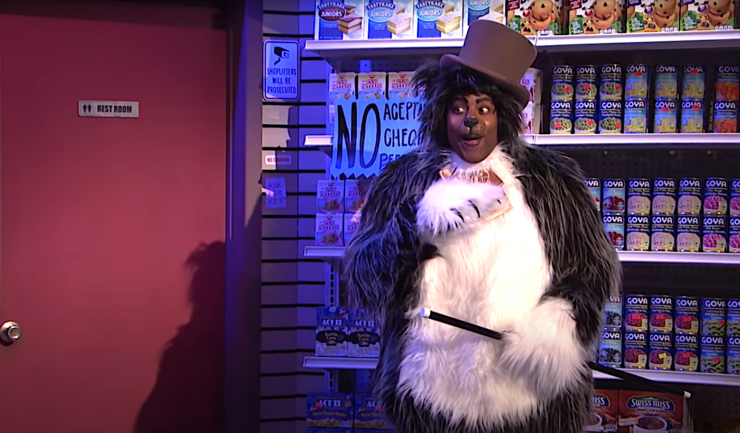
The latest foray into this universe is John Mulaney and The Sack Lunch Bunch, a variety show that stars Mulaney and a group of children. At first you might think that it’s a (very niche) parody of kid’s shows, but it becomes clear that the show is actually balancing on a razor’s edge of irony and sincerity. There is humor, obviously, and some digs at the blindingly earnest children’s TV of the 1970s, but the bulk of the show is written from the children’s perspectives, and it take their hopes and fears seriously. And while I initially assumed the show was in the world of Mulaney’s stand up, with its mix of nostalgia and commentary on current life, the more I thought about it the more I came to believe that The Sack Lunch Bunch special lives in that same surreal New York that the musical trilogy explored. The kids’ headquarters are an urban garden on Sackett Street in Brooklyn, and this New York City seems much like my own, where you’re as apt to see a white woman sobbing in public as you are to see Fran Leibowitz on the subway. The kids’ experiences, too, start out in a realistic children’s world: your parents ignore you even though you’re putting a show on for them; they get annoyed when you only want a plain plate of noodles (with a little bit of butter) for dinner; you know that sleeping in a particular position is the only way to keep night demons at bay. Fine. But then the viewer begins to notice that while the Sackett Street Urban Garden may be in Brooklyn, it’s also in a liminal zone outside of time—tropes from three distinct eras of children’s television jostle for attention, and yet the Bunch themselves seem comfortable in each scene, accepting the ‘90s Barney analogue as easily as the ‘70s Sesame Street puzzle.
And then Mr. Music shows up.
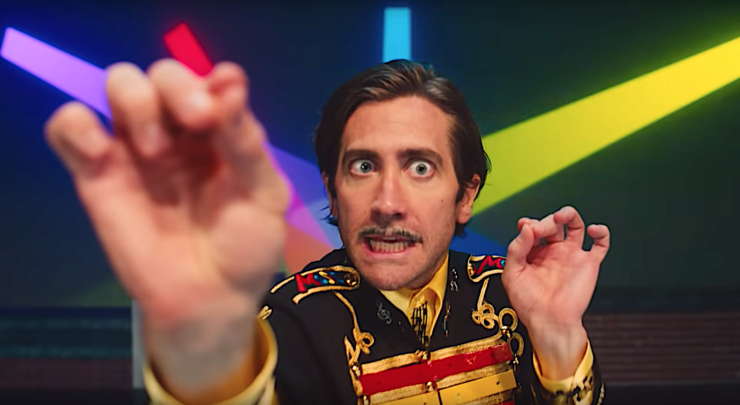
When Jake Gyllenhaal burst onstage as “Mr. Music” is that an act, or is Mr. Music a separate entity in this universe? And if he’s a separate entity—as I suspect he is—what the fuck is he??? He looks human, sure, but I’ll remind you that Mr. B. Natural was able to assume human form. Is his inability to illustrate the point that “you’re making music everywhere” a comment on the futility of all human endeavor? When he worries that “the Lord” doesn’t want him to make music, is he declaring his demonic nature, and ceding a momentary defeat in an eternal battle?
Or is this an homage to the work of Leonard Cohen?
When he admits that rather than preparing for his performance “[he] stayed up all night trying on clothes [he] already owned”—does he mean regular clothing as we imagine it, or is he admitting (as I believe he is) that he was testing different corporealities until he settled on one that wouldn’t frighten the children? Is there a version of Mr. Music that is bejeweled with a thousand winking eyes? One that is simply a glowing slash in the fabric of reality? Did he think the xylophone jacket was less horrifying than HIS TRUE FORM?
What is Mr. Music’s plan for us?
The more Leah Schnelbach thinks about it, the more they want these universes to have a massive crossover event. Come look for music with them on Twitter!










